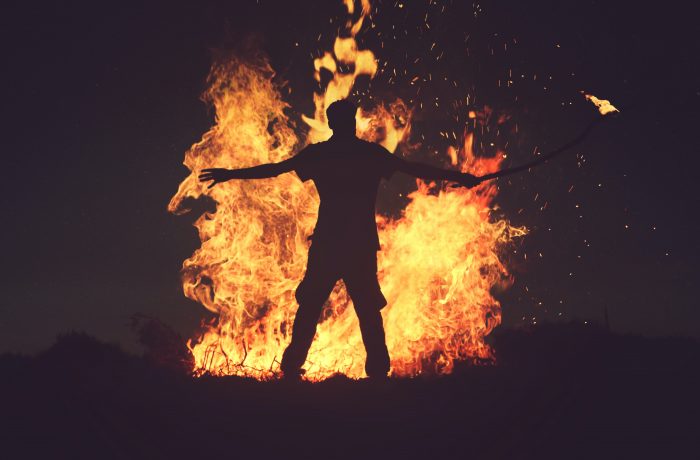There is a difference between anger and violence, and an unhealthy relationship with the first sets the stage for the second.
And it took me until my adult years to learn this.
“Bitterness is like cancer. It eats upon the host. But anger is like fire. It burns it all clean.” ~ Maya Angelou
I spent the first 25 years of life as a self-appointed pacifist. As the oldest child, a good student, a girl, and then a woman, making the peace and diffusing tempers was my assignment. At home, at work, in relationships; be loving. Keep the peace. Put out the fires. Take the flame into yourself, and digest it for the world. This was my role. And it led to an awful lot of soot.
F*ck that role. Life teaches you what you need to learn, and for me, it was that the side effects of not expressing anger when anger is felt, include:
>> Eventual tuning out to the needs of others (how can you empathize with others, if you’re unable to feel anger at injustice toward them?)
>> Continued desecration of the earth (again, if global warming doesn’t make you angry, we’re in a world of trouble.)
>> Self-harm.
>> Inability to hold safe boundaries for yourself.
>> Tolerating unsupportive relationships.
>> Becoming the martyr: at work, in life.
>> Riots.
The feeling of anger does not go away by stifling, it just turns from something pure: clean, crisp, clear anger, able to be felt and expressed, into something more of a parasite. It eats you. A person can work out, sing, dance, travel, hike, search, meditate—and either you learn to stifle and let a flame burn out, or you dull into something of a more dim individual—untouched by the world’s sadness, unable to feel the joys.
Anger is a real emotion. And is just as acceptable as the rest of the emotions—joy, fear, sadness, excitement, connection, isolation—the list goes on. It’s just another person at the party.
So what would happen if we paid proper respect to the emotion of anger, in the first place?
The problem with the recent riots taking place is not that people need a course in anger management. I think the problem is that people have not been allowed to express and be heard in their anger, their appropriately placed anger, in the first place. And, to be clear, not just any people. Some people, namely white males, are fully supported in expressing anger. They are the ones blessed with the gift of appropriately perceived anger, which is neither twisted to term them “emotional” or “nasty” (as we do to women), or “violent” and “unpatriotic” (as we do to people of color).
So the anger goes unexpressed. Nobody has listened. Nothing has changed. What we are seeing is not the result of anger, what we are seeing is the result of anger that was never acknowledged or allowed, which has now become a bleeding, painful ulcer, deep in the belly of our nation.
Even a year ago, probably the worst insult I could get was “you seem so angry.” This was a comment I’d received in response to something I’d posted on social media mourning children being separated from undocumented parents at the border. Why did this comment hurt me? Why did I dodge and manipulate my emotions to find what I thought was the correct response to this?
“I’m not angry, I’m passionate,” was the line I concocted. It felt like a clever save, but it was a lie.
It’s a lie, that we say to make other people, namely white males, more comfortable. I was angry then. And I leveraged that anger into a photography project. And now, again, I’m angry. I’m angry that George gasped for breath and then died under the knee of a white police officer.
Anger is an appropriate emotion to feel when instances of extreme sadness and injustice happen. Anger is an emotion, a real emotion, and is not the same as violence. Anger isn’t reserved for one gender or race. Men feel anger. Women feel anger. White people feel angry, brown people feel angry, black people feel angry.
Right now, I am angry. This does not make me an angry person.
Right now, people are angry. This does not make them angry people.
Anger is not the same as violence. We need to differentiate the two, so that we can allow each other the space to be good and mad, appropriately so.
And then, together, we can begin to heal, and get on to the good stuff, the joy.
~


 Share on bsky
Share on bsky





Read 14 comments and reply